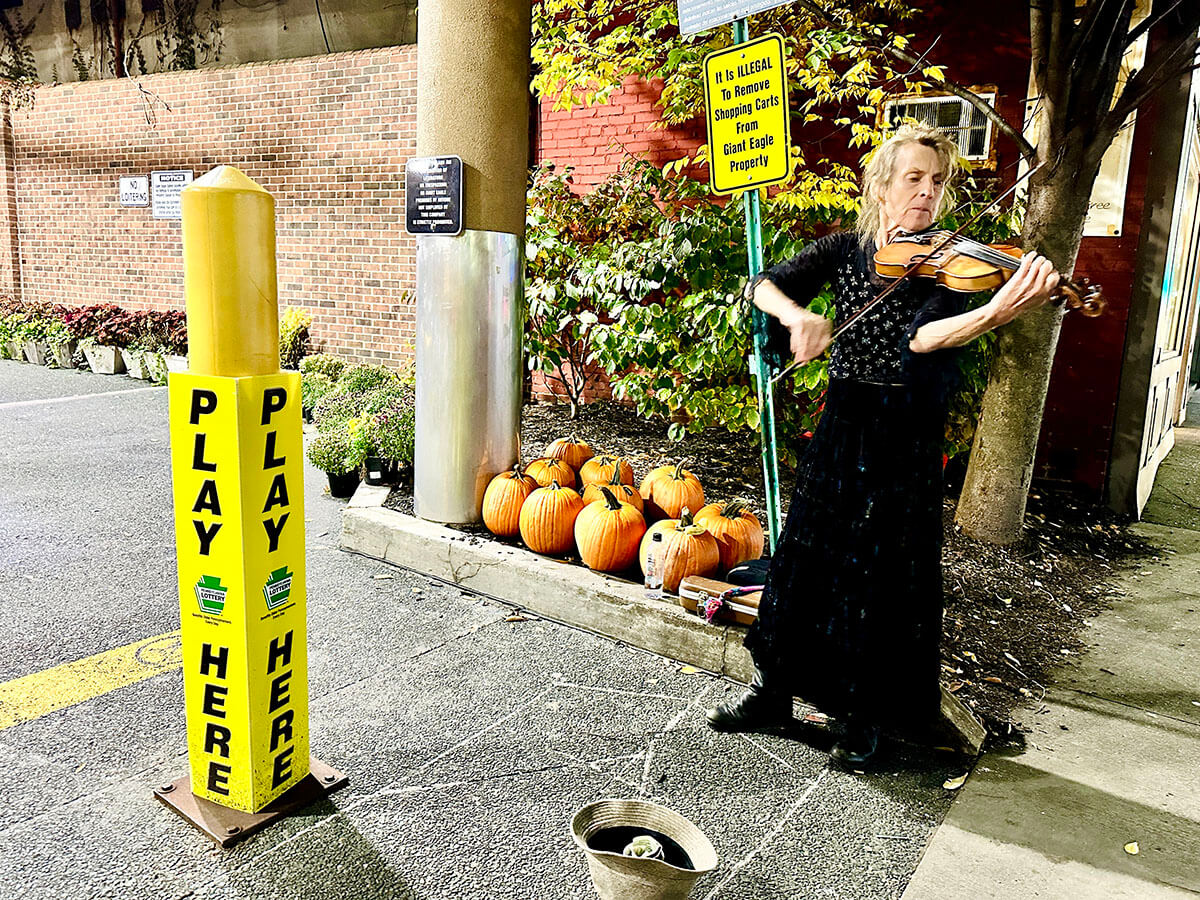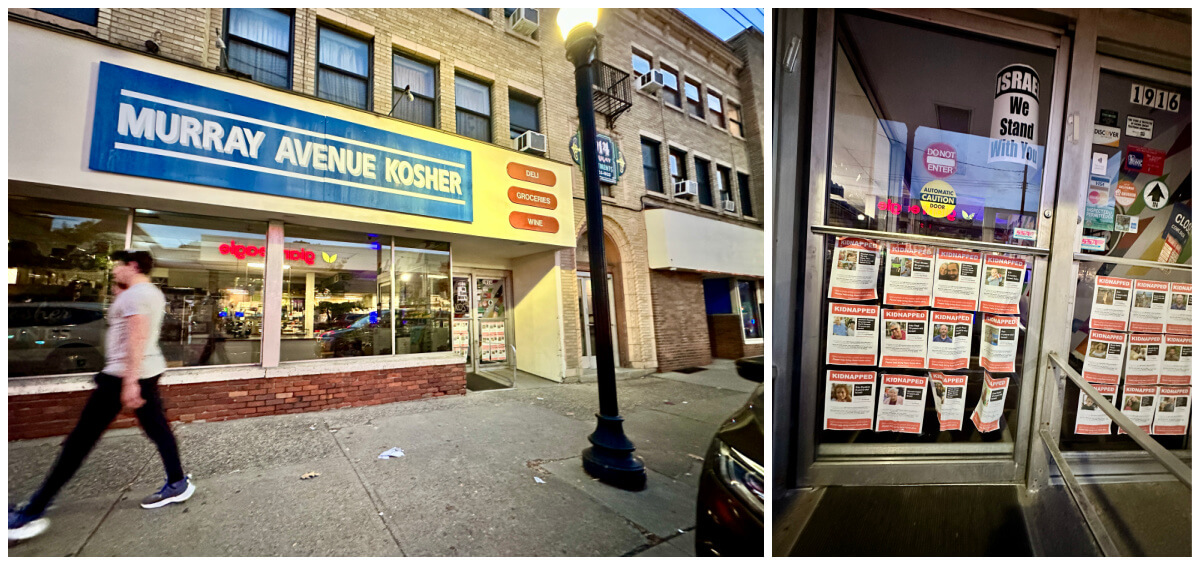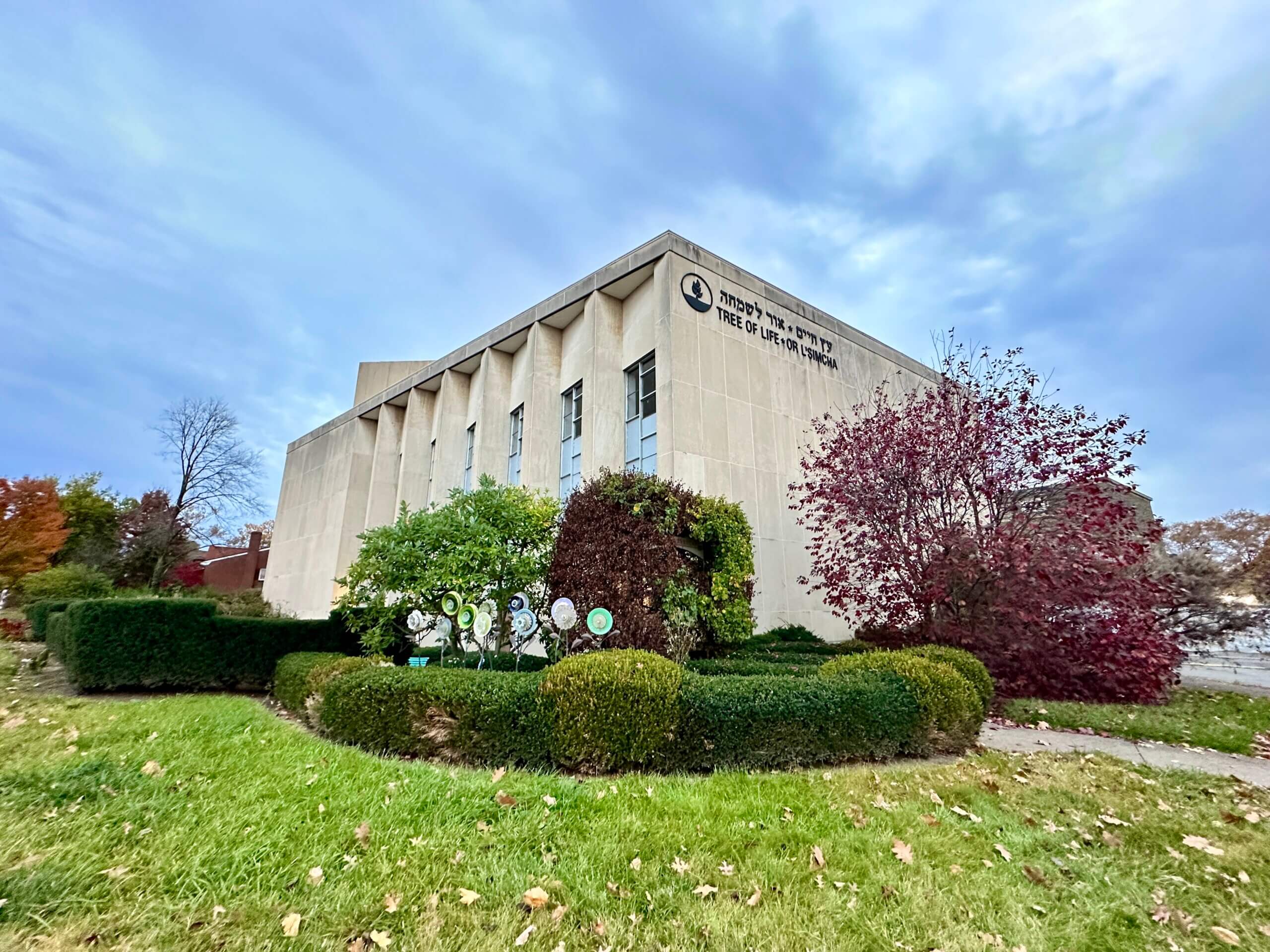Postcard from Pittsburgh: 5th anniversary of Tree of Life falls amid broader grief
The kosher butcher’s front doors are covered with photos of Israeli hostages instead of deals on brisket and whitefish

Kimberly Faught, known as the Gypsy Violin Queen of Squirrel Hill, performs in front a Giant Eagle supermarket in Pittsburgh. Photo by Benyamin Cohen
PITTSBURGH — The Gypsy Violin Queen of Squirrel Hill performed an improvised song of grief Wednesday evening in front of a supermarket here in the heart of the Jewish Pittsburgh.
It was two days before the fifth anniversary of the massacre at the nearby Tree of Life synagogue, the deadliest antisemitic attack in U.S. history. And it was 18 days after the Hamas terror attack on Israel, the deadliest single day for Jews since the Holocaust.
The Gypsy Violin Queen, whose real name is Kimberly Faught, is not Jewish — she describes herself as “of every faith” — but plays here in Squirrel Hill a few times a week. A peripatetic free-spirit, she has been providing a mournful soundtrack for her fellow Pittsburgh residents for 15 years.
“You never know who is walking by, and what difference it has on their day,” she told me. Waving her bow, she rested her chin on the one thing that gives her solace amid mourning. “The violin,” she added, “is such an instrument of hope.”
As we spoke, passersby stopped to wish her well and drop a dollar or two into the tan felt hat propped by her feet, near a display of pumpkins.
This Tree of Life anniversary will be unlike the others, as Pittsburgh’s Jews grapple with how to process their own grief at a time when the Jewish people are in a state of collective mourning. The synagogue shooting killed 11 souls at Shabbat prayer. The “Black Shabbat” Hamas attack slaughtered more than 1,400 and left 200 hostages — including young children and grandparents — in captivity.
The supermarket where Faught was busking is in the walkable neighborhood that’s been home to Pittsburgh’s Jewish community for more than a century. Several synagogues, a Judaica shop and the Jewish Community Center are within a few blocks.
Her mournful tunes could be heard across the street at the Friendship Circle, a Jewish nonprofit. Next door is the local butcher, Murray Avenue Kosher, whose glass front doors, usually displaying deals for brisket and whitefish, were covered with those now-ubiquitous red-and-white posters of the hostages.

Faught, who demurred when I asked her age, also teaches violin at a local library. She once played a wedding at Tree of Life, and has done a benefit concert at one of the local campus Hillel houses.
After the 2018 attack on Tree of Life, she told me, she wanted to do something to help her Jewish neighbors. So she stood on a street corner in Squirrel Hill and played “Jerusalem of Gold,” by Ofra Haza, known as Israel’s Madonna.
A van pulled up, she recalled, and several Orthodox men hopped out. They closed their eyes, bowed their heads and swayed back and forth.
“That song is just beautiful,” Faught said. As she told me the story Wednesday, she hummed a few bars, her voice haunted with emotion. “I get goosebumps when I hear it.”
The Tree of Life massacre is one of seemingly endless mass shootings in the U.S. A few hours after I spoke with Faught, news erupted of the latest, at a bowling alley and nearby bar in Maine, killing at least 18.
For Jews in Pittsburgh, of course, it is something more. The locals refer to it as 10/27, in much the same way many Americans invoke 9/11. And, now, as many in Israel are talking about 10/7.
Around the corner, at Congregation Beth Shalom, I met up with Audrey Glickman, who heard gunshots as she led services at Tree of Life that fateful morning, and survived the massacre by escaping to a closet. When Glickman, who is 66 and 4-foot-10, enters a room, everyone seems to smile, tepidly and cautiously, still unsure of what to do.
She puts people at ease and excitedly talks about what’s going on in her life. But even she doesn’t have the power to change the subject entirely.
Asked if she’s available next Thursday, Glickman scrolled through the calendar on her phone and then looked up. “Nope,” she said. “That’s the night of the yartzeit,” the Hebrew anniversary of the attack, when the survivors and the families of those who died will hold a private service.
The mourning continues.

A message from our Publisher & CEO Rachel Fishman Feddersen

I hope you appreciated this article. Before you go, I’d like to ask you to please support the Forward’s award-winning, nonprofit journalism so that we can be prepared for whatever news 2025 brings.
At a time when other newsrooms are closing or cutting back, the Forward has removed its paywall and invested additional resources to report on the ground from Israel and around the U.S. on the impact of the war, rising antisemitism and polarized discourse.
Readers like you make it all possible. Support our work by becoming a Forward Member and connect with our journalism and your community.
— Rachel Fishman Feddersen, Publisher and CEO




























